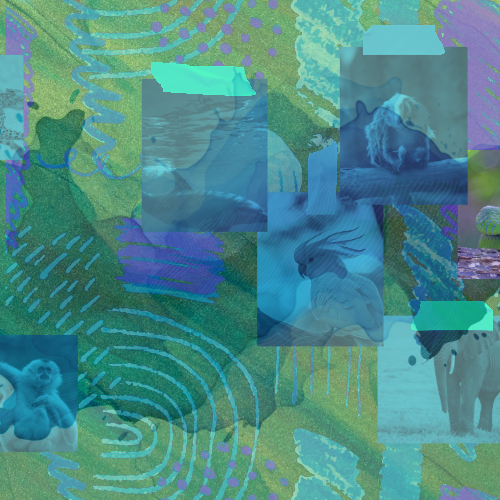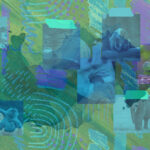Oh Well
Short Story
by Jan English Leary
Irritated by the mess her husband Phil left every evening from his pre-dinner wine and popcorn, Sally took a broom to the errant kernels, salt, and dust on the living room floor. Then she pulled the cushion from his favorite armchair and ran her hand around the edge of the sewn-in seat, pulling out more kernels, a paperclip, a pencil, and a small, smooth rectangle of paper. A sticker with a Komodo Dragon on it. An “Oh Well.” Finding the sticker made her dizzy, so she sat down and put her head between her legs, breathing deeply and slowly, her vision blurry with pixelated diamonds.
At age four, Ben was obsessed with sticker albums. No way of avoiding the strategic display at the supermarket checkout. And Ben was in his keen animal-loving phase, so Animals of the World made sense. He started filling in the album: dolphin, elephant, cheetah, cockatoo, gibbon–one space per animal–peeling off the backing before smoothing it onto the page. She’d tried to help him paste them on straight, but he’d yanked the album from her, insisting on doing it himself. As time went on—more duplicates, fewer new animals. Wasted money on piles of stickers with no use for them. A genius scheme. Get the kids hooked on a nominally educational project and the parents would buy in and not be able to stop until the album was filled. She allowed him five packets at a time, which he’d rip open in the car and toss the wrappers on the floor. “Yes! The toucan.” “The Tasmanian devil and the Poison Arrow Frog. I needed them.” He held each one up for her to see in the rearview mirror. Then, when he found a duplicate he’d say “Oh, well.” Singsong, high note, low note, sweetly accepting the disappointment. He started calling the duplicates Oh Wells. “I only got two Oh Wells, Mama.” She knew mothers whose kids swapped their duplicates with friends. But Ben had trouble making friends, so the piles of Oh Wells grew. By the end of the summer, he was down to one missing animal, the Marmoset Monkey. Weeks went by as she wasted her money only to yield Oh Wells–impalas, black bears, and bluejays. Was the Marmoset Monkey this endangered in the wild? Was that the point, to replicate scarcity in the world? She suspected there might not even be a Marmoset Monkey sticker. Was this some kind of cruel game? Just as she’d decided no more, he nagged and she relented and bought a final handful of packets, which revealed the Marmoset. He was Christmas-morning happy. He flipped through the finished album, “reading” the stickers, smoothing the pages.
But by then, the quest over, he promptly lost interest and moved to something new. She found the album shoved under his bed with dirty clothes, empty juice boxes, plates of half-eaten food covered with ants. How often they had struggled over the mess in his room. Why couldn’t he take better care of his things?
When did “Oh, well,” his grace in disappointment, turn to sadness, despair, then fury? Why hadn’t she seen the obsessive side in this vulnerable boy whose hopes were dashed over and over? Whose obsession with stickers turned into hoarding? He’d always been a packrat, pushing his games and dirty clothes under the bed, gathering books and snacks under the covers with him like a hamster shredding papers for his bedding. Toys and clothes were replaced by CDs and unused textbooks and cigarettes and baggies of weed. Clothes she’d bought him that he didn’t wear, clothes she hadn’t bought him and assumed he’d stolen. Had she missed something in his avid desire to collect? Was it the early sign of a disorder? Mood swings, falling grades, skipping school. She’d hoped this was just a rough patch of adolescence, something he’d outgrow.
Where is Ben now? Two years ago, at age nineteen, he’d come home after dropping out of college with a bipolar diagnosis. She had insisted that he get a job, but after three days of his working at CVS, Sally went in to wake him and found no sign of him, his backpack gone too, his meds left conspicuously on bedside table.
For weeks, she and Phil searched for him, scouring Chicago streets, widening their circles, driving around areas where tents had sprouted like mushrooms. Disposable men, lookalikes, hordes of the unhoused, swarms of lost souls. Eventually, Phil gave up, saying he was done, that Ben would come home when he was ready, but she had to keep looking. Invariably, on her drives, she’d see a man whose head was shaped like Ben’s or who had the same color hair and skinny build. And each time, she was crushed not to find him. Part of her dreaded seeing him living like that. Mostly, she dreaded thinking that he wasn’t living at all. What would she do if she found him? Rush to him or wait until he saw her? Would he run? How did he find food? She imagined him dumpster diving, looking among the tossed-out remains of expired or take-out food. Or did he panhandle to get enough for a convenience store to buy—what? Chips? Beer? Slim-Jims? Did he ever find what he’s looking for, the rare, edible treasure? She couldn’t bear to think what he’d been forced to do to get food.
Did they still have the sticker album? Fearing she’d thrown it out when she’d purged his room of trash, she looked and found it in a bin on the shelf in his closet. Flipping through the pages, she looked at the predators, the vulnerable species, the odd, the beautiful, the armored, the feathered, the scaly, all safe in the album. Ben, vulnerable, odd, beautiful. But not armored. Not safe. She tucked the Oh Well into the book and hugged it to her.

About the Author
Jan English Leary is the author of three books published by Fomite Press: Thicker Than Blood, Skating on the Vertical, and Town and Gown. Her short fiction has appeared in such journals as Long Story Short, Carve, Pleiades, The Long Story, Chariton Review, and others. She lives in Chicago.


